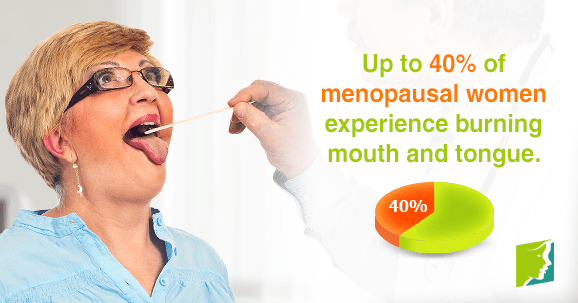At some point, we've all felt that tingling, burning sensation that comes from drinking a hot drink too fast. For some, however, that feeling can last for years. Burning mouth and tongue may be a little-known symptom of menopause, but if it affects you or someone you love, it's time to get all the facts. Read on to discover four things you need to know.
It Affects More People Than You Think
Though not often talked about, many suffer the symptoms of burning mouth and tongue at some point in their lives. The chance of experiencing burning tongue syndrome increases with age, and is seven times more prevalent in women than men. Around 5% of women reportedly experiencing this symptom, most of whom are menopausal. Many people experience burning in multiple areas, but the most common are the tip of the tongue, lips, palate, and lateral border of the tongue.
Causes Can Be Internal or External
The most common cause of burning mouth and tongue is hormonal imbalance. Estrogen, which affects saliva production and taste buds responsible for bitter flavors, is needed to keep oral processes working properly. When levels of estrogen dip, this can cause an uncomfortable 'dry mouth' feeling. Other internal factors may include nutritional deficiencies, like a lack of vitamin B12 or iron, or diseases like diabetes.
Though less reported, external factors also exist that might lead to burning mouth or tongue. Badly-fitted dentures can chafe against gums and trigger the reaction, for example. Allergies could also be to blame. Additionally, habits such as chewing tobacco could desensitize the mouth, as well as lead to oral cancer.
It's Impossible to Know How Long it Will Last
Since all people are different and research is still limited, the length of any one case of burning mouth and tongue cannot be predetermined. Some only suffer through a few months of the condition, but it has been known to last for several years.
It's Treatable
Despite all the uncertainties surrounding burning mouth and tongue, there are ways to find relief. The first step is to reach out to a doctor or dentist if symptoms last for more than a few days to determine the cause. If hormonal imbalance is the culprit, lifestyle changes like a healthier diet and herbal supplements can help you regain equilibrium without a prescription. For serious cases, sometimes antidepressants are used to numb the mouth and tongue, but opinions vary on their safety and effectiveness.
More information on how to handle burning tongue symptoms here.
Sources
- Dahiya, P. et al. (2013). Burning Mouth Syndrome and Menopause. International Journal of Preventative Medicine, 4(1), 15-20. Retrieved from http://www.ncbi.nlm.nih.gov/pmc/articles/PMC3570906/
- National Institute of Dental and Craniofacial Research (2011). Burning Mouth Syndrome. Retrieved November 13, 2013, from http://www.nidcr.nih.gov/OralHealth/Topics/Burning/BurningMouthSyndrome.htm



